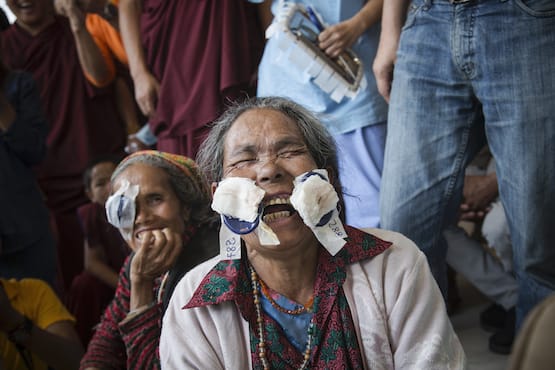The problem: avoidable blindness and visual impairment
At least 2.2 billion people in the world have vision impairment or blindness — and over 1 billion of those cases could have been prevented or have yet to be addressed, according to the World Health Organization. [1]
Blindness disproportionately impacts the world’s poor: about 90% of people with avoidable blindness live in the developing world. [2] A combination of malnutrition, poor water quality, lack of sanitation, and inadequate health care and education contributes to blindness, perpetuating the cycle of poverty and threatening lives.
Blindness takes away much of a person’s ability to function at a high level in school, work, and society, especially in conditions of extreme poverty. It also dramatically impacts entire families, as caring for a blind family member can mean further loss of schooling or work for caregivers.

The solution: low-cost cataract surgeries and vision care
In many cases, awareness of simple health habits and access to eye care can prevent or identify vision problems, while inexpensive medication or surgery can restore a person’s sight and livelihood.
Cataract is the main cause of global blindness and visual impairment. Cataract surgery is low-cost in developing countries and often takes only 10 minutes to perform — it’s an extremely cost-effective way to dramatically improve people’s lives.
How the Fred Hollows Foundation works
The Fred Hollows Foundation was founded in 1992 by Professor Fred Hollows, Gabi Hollows, and a group of their friends and colleagues, following conversations around their dining room table. Since then, The Foundation has become a leader in global eye care. Gabi continues to serve as Founding Director today.
The Foundation provides eye care for some of the poorest countries in the world, performing cataract surgeries for as little as US$50. In 2018 alone, The Fred Hollows Foundation performed 929,106 eye operations and treatments, and treated nearly 24.8 million people with antibiotics for trachoma.

The Foundation works in partnership with local organizations to train health workers and build and upgrade facilities, often in remote areas. In 1994, they helped establish factories in Nepal and Eritrea to manufacture a low-cost intra-ocular lens (IOL) used in cataract surgery. These IOLs could be produced for US$5 instead of the market cost of US$150. To date, more than 7.5 million IOLs have been produced.
They are involved in all aspects of eye care, supporting training, facilities, machinery, expertise, research, and advocacy. They put particular emphasis on training and empowering local people as the key to sustainable change.

